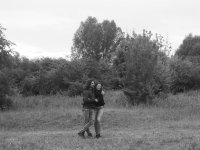text Resource illustration Henk van Ruitenbeek
Frank Menting – DLO applied sciences researcher
‘Unlike many others, I’ve been doing more practical work during the crisis than I did before it. I stood in for a colleague who lives a long way away, and went to the greenhouses every day. I thoroughly enjoyed that, and I learned a lot from it too. I do the rest of my work at home, and I find I can concentrate better there than at the office, where people often pop in with questions. Now I’m working with my wife, who already worked at home. That’s nice, because I’ve got to know another side of her, and also we can have a pleasant coffee break in the garden.’

Lidy de Vreede – Secretary to the Consumption and Healthy Lifestyles chair group
‘The coronavirus crisis has made my life calmer and I see the same thing among people around me. Of course, work goes on, but outside it there are fewer obligations and expectations. Until recently, we couldn’t go to the pub, the cinema or birthday parties. And at work we don’t all have to rush from one location to another now. Working at home did force me to learn to make more use of technology. Which was positive too, because it has made me learn new skills. And I’ve got to know the people I work with in new ways. On Skype and Teams you see other sides to people and discover your colleagues’ hidden talents.’

Allert Smit, who just graduated with an MSc in Biology ‘
When Covid-19 was still something that was happening in Asia, I fell in love. I met an amazing girl who has now been my girlfriend for about half a year. At the beginning of my previous relationships, it could be quite tricky to find sufficient time to get to know each other well. You are both busy living your own lives. But when the lockdown started, and our normal everyday lives collapsed, I could suddenly spend all the time in the world with my new crush. I regard this as a big advantage. We could be together as much as we wanted, and take a moment for ourselves when we needed it as well. We got to know each other very well in a short time, and I think this way we have created a steady foundation for a healthy relationship.’
Maaike de Jong, Education innovator & Lecturer
‘Like many others, I have mainly worked at home in recent months. I am not a fan of that, I teach a lot, and there are many disadvantages to online education, but I have managed to get some positive things out of it too. As you can hear in the background, we’ve got a lot of animals here. We’ve got a large shared garden and we keep chickens, turkeys and pigs. I really like being able to divide my time more flexibly. Normally, I was usually in a rush in the morning to look after everybody and then get to the uni in time. Now I don’t have to rush as much, and I can still take time for them later in the day. The turkeys have got chicks, and I’m seeing a lot more of what goes on now I’m working at home. And when it’s very hot, you can start a bit earlier, take it easy in the afternoon and then do a few hours in the evening. You live more in tune with your natural diurnal rhythm.’
Stefanus Mega Prabawa, MSc student of Food Technology
‘Before Covid-19, I spent most of my time on campus, studying at one of the PCs. The university building were still open until eleven in the evening and during study weeks even until midnight. Now all the buildings close at six, which means I can spend less time studying on campus. To make use of the extra spare time, I started working out in the park with some Indonesian friends. Currently, there are about fifteen of us. First we go jogging for thirty minutes and after that we do fitness exercises. At the weekends, we sometimes cook together and nowadays people from Mexico, India and the Netherlands join our group too.’

Marthe Wassink, BSc student of Soil, Water, Atmosphere
‘For me, the coronacrisis was very stressful on the one hand, but on the other hand it was also a very peaceful time for my housemates and me. I have learned to take more time for myself and to take it easy. We do yoga every morning together, for instance. And I’ve bought an electric piano. It is very nice to practise again every day. What I want to take with me after the crisis: to be in the moment more. The crisis has brought so much uncertainty about the future that it might be better to enjoy the here and now. And to make the best of it together.’
